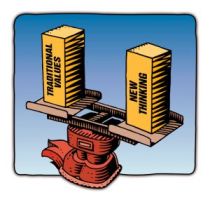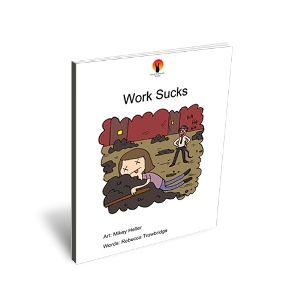Heading for a Fare-ill?
How to Leave on Good Terms, Before You Quit Your Job

So you’re thinking of leaving a job but hoping to make some sort of peace before you quit...?
You don’t get along with your colleagues, don’t like or trust your boss.
Maybe the job you were promised was not the job you ended up doing. Maybe the atmosphere is toxic.
If you’re not popular then you probably don’t trust any referral you might get from people in your department.
In the end, you’ve decided that it’s just not worth being there.
But your farewell, if having one at all, would be more like a fare-ill.
If this is you, congratulations on taking the initiative and deciding to resign.
Sometimes quitting a job on your terms is better than waiting to be
pushed out, especially if you’re not popular with the right people.
Sometimes we need to step backwards or sideways in order to go two steps ahead further on.
– so you can escape with dignity and your professional reputation intact.
That way your career path has only shades of grey, rather than black spots that can undermine your career sustainability.
And at least your farewell will be respectable.
If you want to somehow leave on a good note, or resign in better style than your workplace situation allows right now, read on for what three things you need to know and do in the months before you quit your job.

1. Focus on representing yourself professionally to people outside your department.
If you are not getting along with people in your department, don’t
bother to try now. Make links with people outside that silo – give
quality service to the real customers of your work. Those people can
also serve as referees for your next job as they can also assess the
quality of your work.
Do this without disparaging your own department, as nobody in the
workplace actually cares about your problems unless it’s for idle
conversation and gossip.

You need to represent yourself as a mature professional above
petty complaining rather than involving more people in workplace
politics. Your work, no matter how much you hate it, needs to be the
very best standard.
You need to ensure your work speaks for itself, before you quit your job.
This will help to polarize people’s opinions of you in the workplace,
where people won’t understand why you aren’t popular in your department,
especially if you don’t engage in back-biting yourself.
You will be able to resign gracefully, and there will be people in the company that miss you by the time you have your farewell.

2. Think about what you have learned.
Hopefully before you quit your job, you have by now added more
knowledge to your repertoire of situational leadership: where different
situations require you to behave in different ways, such as when to
avoid issues or be silent, when and how to contribute etc.
In previous jobs you might have been a star performer, however in this job that quality wasn't appreciated.
Or you might have used a particular skill well, although it wasn't needed in this job.

Getting over a bad job requires understanding what you needed to provide
the team, and the role you could have played (other than being the
star, or other than being the passenger).
Even getting to know
what workplace sharks or rats look like is a Positive, and how they
think, so you can predict their actions.
You might even think back to earlier in your time there and see how you might have put people off-side.
Other things you might learn are:

- How systems at work cause people to be placed in conflict situations
- How interaction styles can undermine a project or the goals of the business
- What the goals of the business are
- How management thinks (hint: usually impersonal and like chess pieces - this is not necessarily bad, and understanding this can help you stay ahead of the game)
You only understand when you are emotionally removed enough to be objective about your situation.
You need to be self-aware and honest about your part in any issues.
All of the above will form part of your analysis when you vet other companies.
At
interview time for your next job, you can ask specific
business-oriented questions that can give you a feel for how ‘together’
and professional a company is:

- What are the KPIs (Key Performance Indicator) for this job?
- Are all KPIs from worker to CEO aligned, to meet the business goals?
- How is my work initiated? What are the work priorities?
- How is the department performance evaluated?
- Who are the main customers of my work?
- Are key policies in place such as harassment and discrimination, and what have management done this year to be proactive about these policies?
If your interviewers seem unsure about these questions or can’t answer them satisfactorily, then this should be a warning bell that the organization risks having similar system problems to your current workplace.

By thinking about what you have learned from your bad work experience
(even better if you do this before you quit), you can remove yourself
emotionally from the situation, even understand why the rats around you
behaved the way they did.
Then you can leverage this knowledge into becoming savvier in your next job, and in life.
3. Be positive; Let go.
Create a plan for what you will do post-job.
Start a new hobby
that you’ve always wanted to do, start going to concerts, visit friends
or go fishing on the weekend – anything to put a smile on your face
while you still have to go to work, before you quit your job.
Look forward to the future, rather than dwell on the past.
Don't bother with the petty concerns of your department, just represent yourself well.
Why? Nothing is more victorious than having a happy life and living well.
It might also improve the energy around you at work.
When you let something go, it no longer has power over you.

When you appear relaxed and happy while others are
back-biting or stressed out, they can be frustrated that they don’t have
a negative effect on you. Remember that back-biters turn on each other
as well. Lift yourself out of the cesspit before you quit your job.
You may even find that after a while, opinion turns and you're in the good books!
Be magnanimous and courteous, but get your hopes too high about your co-workers - you've learned
too much!
You might become popular but don’t expect apologies or introspection from others.

Why? We are hard-wired as humans to deny any wrongdoing on our part,
and we will often justify or rationalize our actions – in order to
psychologically survive.
Our egos will protect us from depression
(as a result of realizing our wrong-doing) as it might lead to forms of
self-harm. This is a neuro-physiological fact (referenced from Social
Intelligence by Daniel Goleman), and why step 2 of this article might be
hard.
So don't waste energy expecting others to really improve, work on your own fulfillment.
Let go, focus on business at hand before you quit, and live well.
Cheap Therapy in a Story Card


Story card

Ebook download
The title says it all. Cheer up a friend or yourself with this blunt summary of work-life.
Simply download an e-story for and print it out, or order a paperback version.
The paperback version is 11 pages long (including title and copyright pages), in a handy card size with plenty of space for signatures and messages.
What happens in the order process?
You will be directed to the
Lulu.Com website and you can select your order there. Make sure you
choose correctly which item you want, whether it be a downloadable
e-story, or the paperback card.
Tip! Check for Lulu coupons before you buy.
Lulu.Com is responsible for the printing and shipping (or download), payments and everything associated with your purchase.
Fond-farewell.com only takes credit for the story!
If nothing else works, this will make you laugh!




